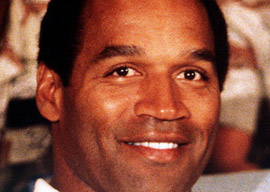
June 22, 2016

OJ Simpson
Third, O.J.’s coach at Tailback U., USC’s John McKay, was not one of these old-fashioned helmsmen who thought it sporting to let everybody have a chance with the pigskin. McKay believed in recruiting a superstar running back and then giving him the damn ball, 35 times per game in 1968. When asked why he had Simpson carry the ball so often, McKay, a noted wit, responded, “Why not? It’s not heavy, and he doesn”t belong to a union.”
My vague recollection is that McKay also used that line after he had Ricky Bell run for 347 yards on 51 carries in 1976.
Bell died of dermatomyositis in 1984.
There’s a possible fourth reason for O.J.’s sudden fame, but one that needs to be put in question form: Was The Juice on the juice?
For some reason, the possibility that Simpson’s supremacy might have stemmed from early use of steroids seldom comes up in trying to make sense of the Legend of O.J. The usual assumption among sports fans is that O.J.’s era was an Age of Innocence before steroids. But the more I look into the history, the more likely it seems that some heroes of my L.A. childhood were experimenting with performance-enhancing drugs.
Los Angeles was the center of the sports world in the 1960s, including track and field. Did that have anything to do with Muscle Beach being one center of early steroid expertise?
In 1966, William M. Fowler of the UCLA medical school reported that steroids were unethical and perhaps ineffective, although popular among weight lifters and strength athletes in track and field.
Interestingly, Fowler didn”t ask football players, although this era was one of the high points of UCLA’s football prowess, with 1967 one of the two times UCLA and USC were #1 and #2 when they met in late November. (In 1981 I asked a former UCLA All-American why USC usually beat UCLA. He replied, “Because the USC players know that if they beat UCLA they…will…be…rewarded.”)
When basketball big man Wilt Chamberlain was traded to the L.A. Lakers in the summer of 1968, he started hanging out at Muscle Beach in Venice and soon added 40 pounds of muscle. Perhaps he did it all just with weight lifting (few other NBA players lifted weights in the 1960s), and without pharmaceutical help.
But my impression is that Wilt wasn”t the kind of guy to refrain from trying something just because it was cutting-edge and the ethics were uncertain (note that steroids back then were considered scandalous if noticed, but weren”t a controlled substance). Wilt was easily bored and loved new things. Turning himself into a human science experiment in the revolutionary year of 1968 doesn”t sound like the kind of adventure Wilt would have passed up on general principle.
What about O.J.? The Juice was an outstanding track athlete at a time when Southern California’s leading track-and-field medicine man, Dr. H. Kay Dooley of track center Pomona, Calif., openly advocated steroid use. Dooley performed a steroid experiment on high school football players in 1965 and reported that, sure enough, they were pretty darn effective. He told writer Jack Scott in 1971, “A lot of physicians are stuffed shirts when it comes to sports.”
With Russia’s track team being threatened with exclusion from the 2016 Rio Olympics for drug cheating, it’s interesting to note that Dooley was the team doctor of the famous 1968 U.S. track team that set so many records in the thin air of Mexico City. Perhaps Dr. Dooley’s prescriptions played a role in some iconic 1968 Olympic moments?
While it’s long been well-known that steroids were a factor in Olympic throwing events like the shot put, the usefulness of performance-enhancing drugs in sprinting wasn”t widely understood among casual fans until Ben Johnson was stripped of his gold medal two days after setting the 100-meter-dash record at the 1988 Olympics. But the impact of steroids on speed was known to some experts much earlier.
None of this proves that O.J.’s revolutionary impact on football was due to steroids. Keep in mind that O.J. had been recognized as a major talent since a young age. There is an interesting story of an adolescent O.J. endangering his athletic career in San Francisco due to his gangbanging tendencies, so the San Francisco Giants” all-world center fielder Willie Mays called him up. Willie didn”t try to argue the young O.J. out of being a thug. He just had the kid hang out with him for a day. Mays” implicit message to Simpson was: This kind of life can be yours, too…if you don”t screw it up.
Eventually, after being given countless second chances by white society, O.J. screwed it up.